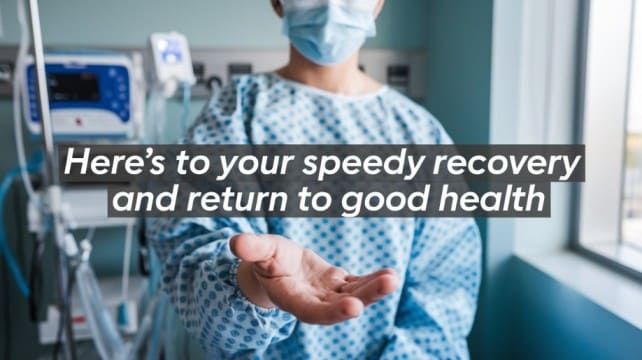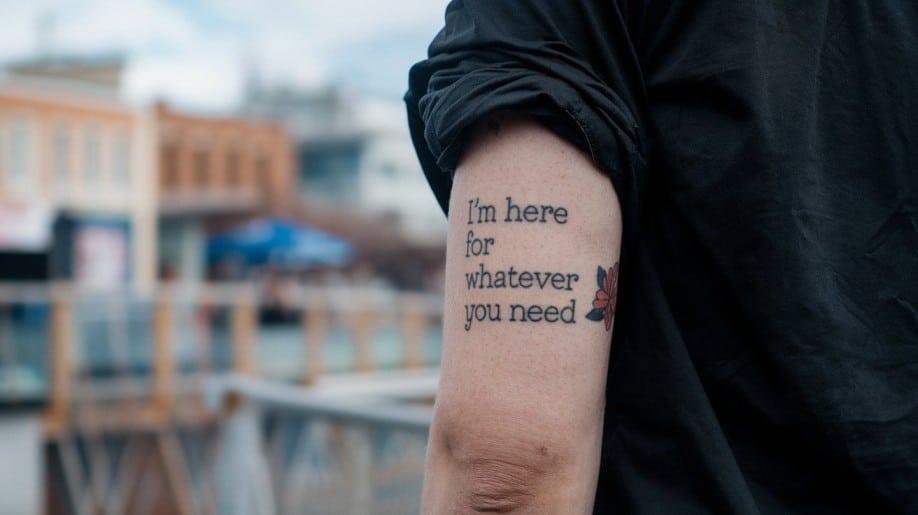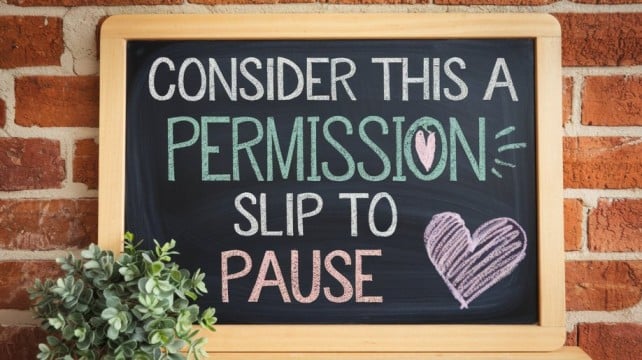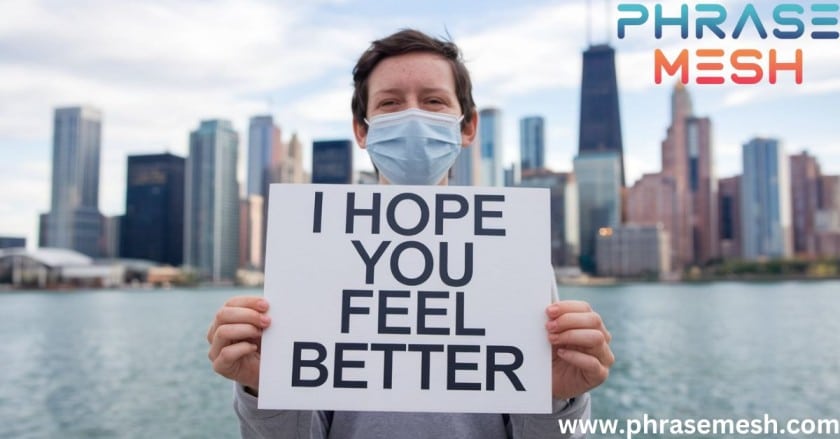When someone isn’t feeling their best, a simple “I hope you feel better” can lift their spirits. However, using the same phrase repeatedly may feel a bit impersonal. Whether you’re comforting a friend, family member, or colleague, switching up your words can show extra care and consideration.
Here are 20 creative ways to say “I hope you feel better,” each with its own touch of warmth to make your wishes truly memorable. After all, the way we say “I hope you feel better” can make all the difference in bringing a smile to their face. So, let’s dive into some unique alternatives to “I hope you feel better” that go beyond the usual.
Is It Nice to Say “I Hope You Feel Better”?
Saying “I hope you feel better” shows genuine care and concern for someone’s well-being. While it’s a common phrase, its impact lies in the sincerity behind the words rather than the phrase itself.
This simple expression can offer comfort and emotional support during challenging times, whether someone’s dealing with a minor cold or a serious illness. However, the effectiveness of this phrase often depends on your relationship with the person and the specific situation they’re facing.
Pros of Using “I Hope You Feel Better”
- Shows immediate empathy and awareness of someone’s situation
- Offers a quick, sincere way to express concern
- Works well in both casual and formal settings
Cons of Using “I Hope You Feel Better”
- May feel generic or overused in serious situations
- Could seem inadequate for severe health issues
- Might not convey enough personal connection or support
What To Say Instead of “I Hope You Feel Better
- Sending Healing Thoughts Your Way
- Wishing You Strength During Your Recovery
- Take All the Time You Need to Rest and Recuperate
- Thinking of You During This Time
- Here’s to Your Speedy Recovery and Return to Good Health
- Sending You Warmth and Comfort Until You Feel Better
- May Each Day Bring You Closer to Feeling Your Best
- You’re Stronger Than You Know – Get Well Soon!
- Take It Easy and Focus on Healing
- I’m Here for Whatever You Need
- Your Only Job Right Now is Getting Better
- Each Small Step Forward is Progress
- Your Resilience Inspires Me
- Better Days Are Coming
- Letting You Know You’re in Good Thoughts
- Remember to Be Gentle with Yourself
- Sending You Sunshine Until the Clouds Pass
- Your Health is Worth Taking Time For
- Holding Space for Your Healing
- Consider This a Permission Slip to Pause
1. “Sending Healing Thoughts Your Way”

This gentle expression conveys both emotional support and positive energy. It’s perfect for various situations, from minor ailments to more serious health concerns.
Example Scenario (Text Message):
“Hi Sarah, just heard about your bout with the flu. Sending healing thoughts your way. Let me know if you need anything delivered to your door. – Emma”
2. “Wishing You Strength During Your Recovery”
This phrase acknowledges the challenge while expressing confidence in the person’s ability to overcome it. It’s especially appropriate for situations involving recovery from surgery or long-term illness.
Example Scenario (Get Well Card):
“Dear Marcus, As you focus on your recovery after surgery, I’m wishing you health and strength for each new day. Looking forward to seeing you back on the tennis court! Warmly, David”
3. “Take All the Time You Need to Rest and Recuperate”
Sometimes, people need permission to focus on their well-being. This phrase offers comfort and understanding while encouraging necessary downtime.
Example Scenario (Work Email):
“Hi Jessica, Please focus on taking care of yourself and rest and recuperate. The team has everything covered here. Your health and wellness comes first. Best, Michael”
4. “Thinking of You During This Time”
This simple yet powerful message shows your ongoing care and concern without overwhelming the recipient.
Example Scenario (Social Media Message):
“Dear Ana, thinking of you during your treatment. Your strength inspires us all. Sending you warm hugs and positive vibes. ❤️”
5. “Here’s to Your Speedy Recovery and Return to Good Health”

This uplifting message focuses on the positive outcome while offering encouragement for the healing process.
Example Scenario (Group Card):
“Dear Professor Thompson, The entire department wishes you a speedy recovery! We miss your witty jokes and insightful lectures. Looking forward to your return when you’re fully restored to health improvements. Your Students”
6. “Sending You Warmth and Comfort Until You Feel Better”
This expression wraps the recipient in a virtual hug through comforting words, perfect for when you can’t be there in person.
Example Scenario (Handwritten Note):
“Dearest Grandma, I wish I could be there to make you soup and take care of you. Until then, I’m sending you warmth and hoping you feel better soon. Call me anytime – day or night. Love, Sophie”
7. “May Each Day Bring You Closer to Feeling Your Best”
This forward-looking message acknowledges the gradual nature of healing while maintaining optimism about the outcome.
Example Scenario (Email to Colleague):
“Hi Robert, Just wanted to send some supportive messages your way. May each day bring you closer to feeling your best. The office isn’t the same without your energy! Best wishes for recovery, Linda”
8. “You’re Stronger Than You Know – Get Well Soon!”
This encouraging message combines emotional support with a vote of confidence in the person’s resilience.
Example Scenario (Text to Friend):
“Hey Chris! I know this recovery hasn’t been easy, but you’re handling it like a champion. Get well soon – we’ve got adventures waiting! 💪”
9. “Take It Easy and Focus on Healing”
Sometimes, simple sympathy messages that give permission to slow down are exactly what someone needs to hear.
Example Scenario (Professional Email):
“Dear Dr. Martinez, Please take care and focus on your healing process. Your contributions to our research are invaluable, but your well-being comes first. Warm regards, The Research Team”
10. “I’m Here for Whatever You Need”

This practical offer of support shows you’re ready to help with both emotional and practical needs during their recovery.
Example Scenario (Voice Message):
“Hi Lisa, just wanted you to know I’m thinking about your recovery and I’m here for whatever you need – whether it’s grocery runs, dog walks, or just someone to talk to. Your health improvements are what matter most right now.”
11. “Your Only Job Right Now is Getting Better”
This reassuring message removes pressure and gives permission to focus solely on health and wellness.
Example Scenario (Work Chat):
“Hey Rachel, I know you’re worried about the project, but your only job right now is focusing on your recovery. We’ve got everything handled here. Take care and come back when you’re 100%.”
12. “Each Small Step Forward is Progress”
Acknowledging incremental improvements can provide powerful encouragement during challenging recovery periods.
Example Scenario (Text to Family Member):
“Dear Uncle Jim, Mom told me about your first post-surgery walk today. Each small step is progress! Sending healing thoughts your way as you continue to build strength. Love, Nicole”
13. “Your Resilience Inspires Me”
This uplifting message recognizes someone’s strength while sending positive vibes.
Example Scenario (Social Media DM):
“Hi Maria, watching you handle this health challenge with such grace is truly inspiring. Wishing you health and continued strength. You’ve got this! 💪”
14. “Better Days Are Coming”
A simple reminder that current difficulties are temporary can offer hope during the healing process.
Example Scenario (Get Well Card):
“Dear Alex, Better days are ahead! Until then, focus on giving yourself time to rest and recuperate. Thinking of you and looking forward to our next coffee chat. Warmly, Patricia”
15. “Letting You Know You’re in Good Thoughts”

Sometimes subtle supportive messages can be more powerful than elaborate expressions.
Example Scenario (Quick Email):
“Hi Professor Williams, Just dropping a note to let you know you’re in good thoughts. Here’s to your speedy recovery – the department misses your wisdom and wit! Best regards, The Graduate Students”
16. “Remember to Be Gentle with Yourself”
This compassionate reminder encourages self-care and patience during the healing journey.
Example Scenario (Personal Note):
“Dear Amy, During your recovery, remember to be gentle with yourself. Your body knows how to heal – trust the process. Best wishes for recovery! Love, Sarah”
17. “Sending You Sunshine Until the Clouds Pass”
This metaphorical expression offers warmth and hope while acknowledging current challenges.
Example Scenario (Wellness App Message):
“Hey Danny, heard you’re not feeling your best. Sending healing thoughts and virtual sunshine your way. Hope you feel better soon! 🌞”
18. “Your Health is Worth Taking Time For”
This validating message reinforces the importance of prioritizing well-being.
Example Scenario (Professional Email):
“Dear Ms. Thompson, Your health improvements are worth all the time needed. Please don’t rush your return – focus on healing completely. The team sends their comforting words and support. Best, HR Department”
19. “Holding Space for Your Healing”
This mindful expression shows ongoing support without creating pressure.
Example Scenario (Support Group Message):
“Dear James, We’re all holding space for your healing journey. Your health and wellness matters to us. Get well soon – we’re here whenever you need us. Your Wednesday Group”
20. “Consider This a Permission Slip to Pause”

This playful yet meaningful message grants explicit permission for self-care.
Example Scenario (Friendly Text):
“Hey Lisa! Consider this your official permission slip to pause, rest, and focus on feeling better. No need to respond – just take care and know I’m sending lots of positive vibes your way! 🎫✨”
Making Your Message Matter
When crafting these messages, consider the recipient’s specific situation and your relationship with them. The key to providing meaningful emotional support is balancing:
- Acknowledgment of their challenge
- Hope for their recovery
- Practical support offers
- Respect for their space
Remember that your genuine care and concern often matters more than finding the perfect words. Sometimes, a simple message showing you’re thinking of them can provide the emotional support they need during their healing journey.
Whether through a quick text, thoughtful email, or heartfelt card, your words can offer comfort and encouragement to someone focusing on their health improvements. The most important thing is that your message comes from a place of authentic concern for their well-being.
Don’t forget that follow-up messages can be just as meaningful as initial ones. Sometimes, knowing that people continue to care throughout the recovery process provides ongoing support that helps maintain positive spirits and healing momentum.
frequently asked questions: about (I Hope You Feel Better)
1. When’s the perfect moment to say “I hope you feel better”?
Life throws curveballs, and timing matters! Drop this caring phrase when someone first mentions their illness or shortly after learning about it. Whether it’s a co-worker’s migraine or your best friend’s flu, expressing concern early shows you’re genuinely tuned in to their well-being. Just remember – it’s never too late to show you care!
2. How can I make “I hope you feel better” sound more sincere?
Breathe life into these five words! Add personal touches like “I heard about your cold – I hope you feel better soon! Remember that chicken soup recipe you loved? I’d love to bring some over.” This transforms a simple supportive message into a meaningful gesture of care and concern.
3. Should I say this phrase in professional emails?
Absolutely – but let’s dress it up for work! In professional settings, you might write: “I trust you’ll make a full recovery soon. The team and I look forward to your return when you’re fully rested.” This maintains professional boundaries while showing authentic concern.
4. What if someone has a serious illness – is this phrase appropriate?
Handle this with care! For serious conditions, consider strengthening the sentiment: “I’m here to support you through your recovery journey” or “Sending healing thoughts your way – please let me know if you need anything specific.” These variations offer deeper emotional support.
5. How many times can I say it to the same person?
Think of it as checking in on a friend! Instead of repeating the same phrase, mix it up with variations like “How are you feeling today?” or “I’m thinking of you – any improvements?” This shows ongoing care and concern without sounding like a broken record. Each check-in reminds them they’re not alone in their healing journey.





